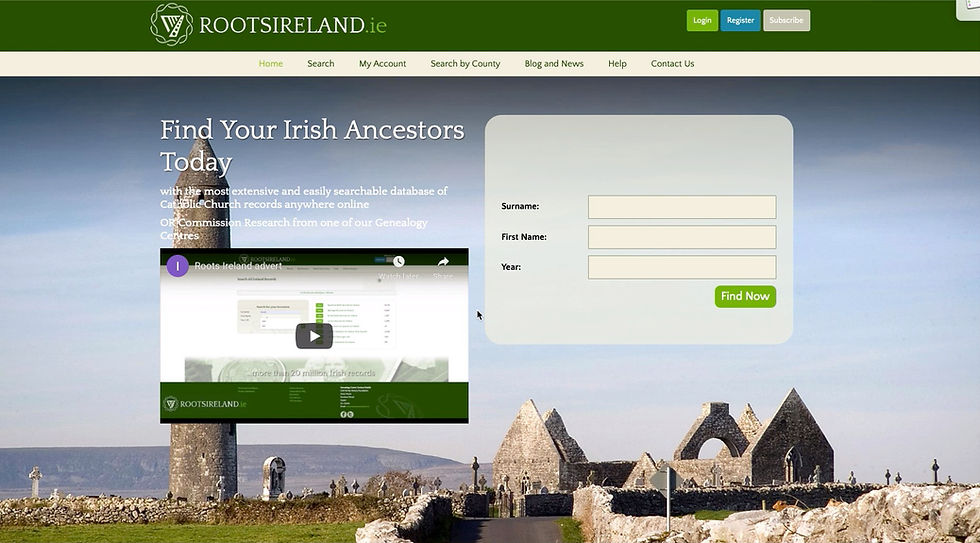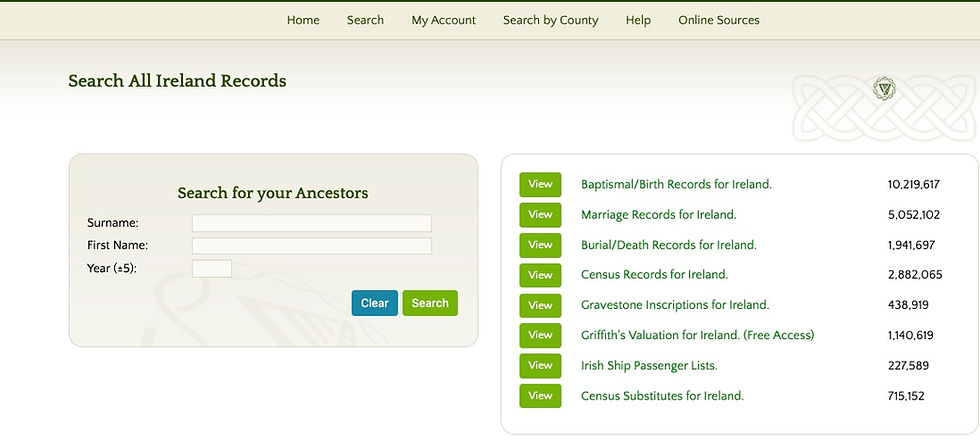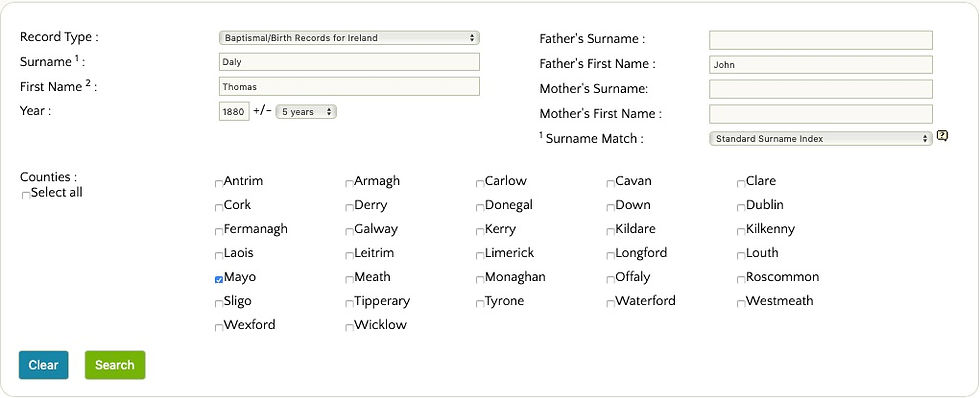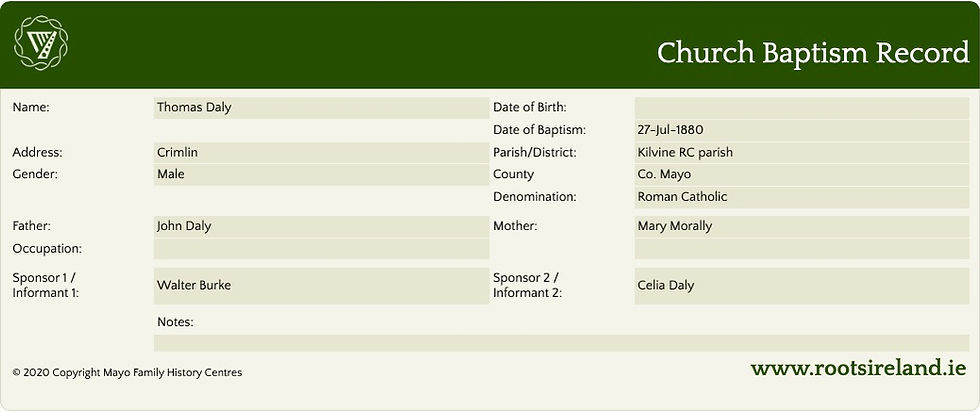
If the events in the life of your Irish ancestor took place before Civil Registration, you will need to use church records. All church records are not created equal and will depend on the timeframe and the location (as do all Irish records). If you are not familiar with the issues of the various denominations, you can read about them in other blogs: Roman Catholic; Church of Ireland; Presbyterian; Other Denominations.
First step...Do the records exist for the time and place of your ancestor's event. Check the status at IrishAncestors. (If you didn't read that blog it's here.) There is no point in searching for the records if they don't exist. If you see the reference: Online Transcript: paying the records have likely been indexed at RootsIreland.
In the late 1980s and early 1990s Ireland developed a scheme of setting up Heritage Centers, at least one for each county. The idea was to transcribe the Roman Catholic records and put them in a database to be used by the Heritage Centers to provide a pay service for the diaspora looking to trace their Irish roots. The second purpose was to teach computer and database skills to young Irish people at a time of high unemployment. Each Centre made arrangements with the local parish priests to use their registers (rather than the microfilm copies at the National Library). Once the databases were completed it was expected that these Centres would make money by providing Family History Reports to the diaspora. A researcher traveling in Ireland could visit the Centre, but could not conduct their own research. They would have to pay for the research to obtain the information. As you might expect, some Centres were better than others, and some closed and once they closed their records were no longer accessible. The Irish Family History Foundation was created as an umbrella organization to make these records available, originally as a Pay-Per-View and today as a subscription site at RootsIreland.ie. Since the beginning of this project, their role has expanded and they now have some records for all denominations, as well as other types of records.
This is a subscription site, however you can subscribe for as little as 24 hours. Note: There is currently a 20% discount on an annual subscription, but only until July 14th. You can click on the image below to go to their website.
Once you are registered you can search the site. Although I primarily use RootsIreland for church records they also have other records. The availability of records is dependent on what the local Heritage Centre has available. There are 34 Centres still active and last year over 200,000 records were added.
I know the tendency is to jump right in and search, but please stop. What is your research question (you do have a Research Plan, right)? Unless you have a unique name, you need to know where in Ireland you ancestors lived. The Moughty name only comes from a small area of Longford and Westmeath which is helpful, however the spelling causes some other headaches. The Daly name on the other hand provides over 39,000 baptismal records and 17,000 marriage records! Then there is the issue of the corroborating details. When you find multiple Michael Dalys in the same County, or even in the same Civil Parish, how are you going to know which one is yours? You need to know some other information such as the names of the parents. If you don't have the information about the locality, check out some of my blogs that are tagged with Finding the Locality in Ireland. So what do you do once you have the locality information?

Click on "Online Sources," select the County and see if the records are available for the time and place where your ancestors lived. Below is the list of sources for the Mayo South Heritage Centre (there are two Centres in Mayo). Notice that most of the records end about 1900. This will vary by Centre...I've seen some as late as the 1930s. For the Roman Catholic Parish of Kilvine, the records don't start until 1870, however the adjoining parishes of Bekan (1832), Annagh (1851) and Crossboyne (1825) have earlier start dates. You'll also find some locations have baptism, but no marriage records. Although there are exceptions, most Roman Catholic Churches will have no burial records. Make sure you know that there is a possibility of finding the records before you search.

Once you determine that the records cover the area and time, you can search. You have a couple of choices. You can just go to the Search menu, type in the name and approximate year (notice it defaults to ±5 years).

There are 204 results, but when you click on Baptismal Records, you can select the County to further limit the results. I find it helpful to also use the father's given name. I don't always use the mother's name because sometimes it's left off the record or the record doesn't give her maiden name. You will not get a result if you have additional information that is not matched in the database. If you get too many hits, you can try to add it in.

The additional criteria bring the results down to just three names.

When I click on the Church Baptism for 1880, I get a transcription of the record.

A second way to search is to "Search by County." Select the County and an additional field shows up in the Search Box. Here you can select the specific parish. As it turns out, Daly is not as common a name in Mayo as in other areas. I use this when I'm doing cluster research, or I'm trying to identify siblings of an individual. There is a good chance that people of the same surname living in the same parish are somehow related. Here I am looking for any Dalys baptized in Kilvine Roman Catholic Parish.

And the results are 33 matches. As I review each one of these I can put them into my spreadsheet and sort by father and/or "address" if given to look at family groups. You're also likely to see the names of the sponsors repeat on many of the results, also an indication of a relationship.

The process is the same if you're looking for a marriage. Remember that most Roman Catholic records will not include Burials.
Below is a video which demonstrates the use of the site.
Happy Hunting and Stay Safe!

RootsIreland was initially created to database the Roman Catholic Records and they borrowed the original books from the parish priest, so , no they didn't give details. Many of these records have since been indexed from the microfilms at the National Library and are available at Findmypast and Ancestry. In some cases they are beginning to link the transcription to the NLI image. If not, you can easily find the original at the National Library site by filtering on the date of the event. As they added other denominations, the parish field will tell you the source and since most church records are in date order, you would need to find out the status of the originals to …
Hello, I've used this site before but they didn't actually give you the source, volume and page. Is this still the case? Thanks.
I am too. Glad it works for you
Thank you for the video's. As a visual person they have been extremely helpful.
Just make sure that RootsIreland has the records for the time and place. Good Luck.